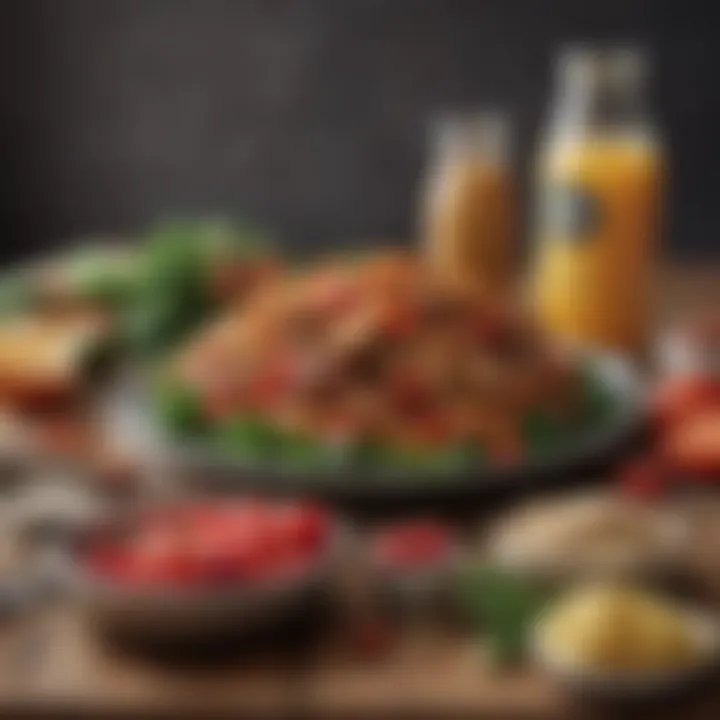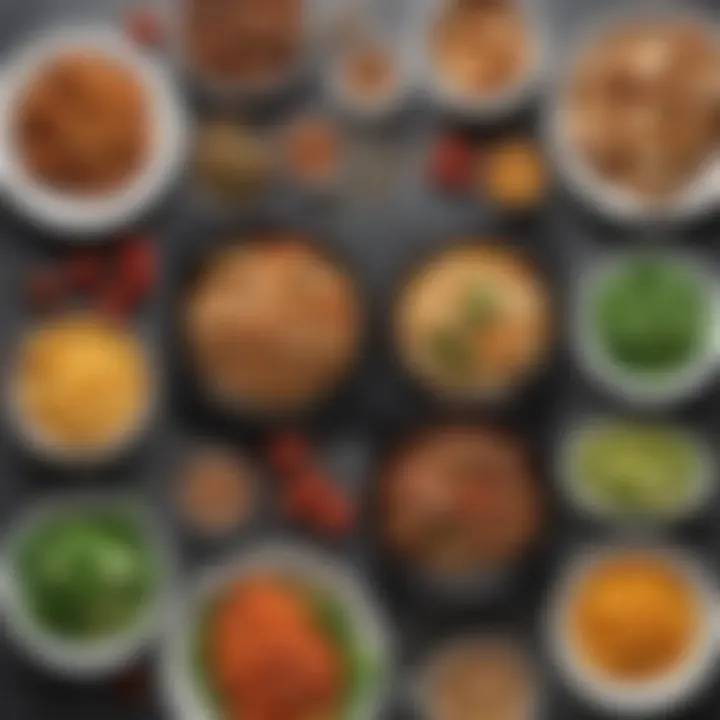A Detailed One Month 1200 Calorie Diet Plan


Intro
Navigating the murky waters of dieting often feels like walking a tightrope—balancing health benefits against the constant pangs of hunger. One diet that emerges from this chaotic landscape is the 1200 calorie diet plan. This might raise a few eyebrows. Cutting down calories to 1200 per day? How could that be sustainable? But before you dismiss it outright, let's take a deep dive into its mechanics and understand its relevance.
For many, the charm of a 1200 calorie diet lies in its structured approach. It’s designed to facilitate weight loss, albeit in a controlled manner. The idea is to create a caloric deficit without sacrificing nutritional needs. Here, we will dissect this plan into digestible morsels, from nutrient-rich recipes to practical tips for achieving success. It's not just about shedding pounds; it's also about fostering a wholesome lifestyle amidst the hustle and bustle of daily routines.
Throughout this guide, we will articulate the essentials of meal planning, shedding light on how to incorporate a range of foods without compromising on taste or satisfaction. You’ll discover how to maintain nutritional balance while keeping your taste buds happy. Having a roadmap can make all the difference when embarking on such a dietary adventure.
Brace yourself as we dissect, explore, and ultimately embrace a one-month journey into a lesser-known realm of low-calorie dieting.
Understanding the Calorie Diet
When we talk about a 1200 calorie diet, it's essential to bounce off the foundational understandings of what this entails. This dietary approach often raises eyebrows, conjuring images of extreme restrictions. Contrarily, it’s not about starving oneself or adopting fads; it’s about making educated choices that could lead to lasting changes in a person’s relationship with food.
What is a Calorie Diet?
At its core, a 1200 calorie diet is simply a plan that limits daily caloric intake to 1200 calories. This type of restricted eating is often employed by those looking to shed some pounds. It requires careful planning to ensure that each calorie packs a punch in terms of nutritional value. It's not merely about cutting food; it’s about being selective and wise with what you consume.
For example, opting for a cup of kale, which is nutrient-dense, over a sugary snack not only fills your stomach but also supplies your body with essential vitamins.
Its sheer simplicity can be enticing, but understanding the nuances of this plan is crucial. Too many people jump into such diets without a well-rounded grasp of what they entail.
Who Should Consider This Diet?
This diet isn’t for everyone; some individuals might benefit more than others. People looking to lose weight may find it particularly effective. However, it must come with a word of caution. Pregnant or nursing women, children, and those with specific health issues should steer clear or consult a healthcare provider. Furthermore, if someone has a history of eating disorders, diving into a caloric restriction can be slippery slope.
In general, active individuals, or those who have a higher caloric intake requirement, may not find a 1200 calorie diet suitable. Instead, it’s a better fit for sedentary individuals or those trying to kickstart their weight loss in a controlled manner. Taking a good hard look in the mirror and checking in with one’s lifestyle can help in determining if this is a step worth taking.
Benefits of a Caloric Restricted Plan
The benefits of adopting a 1200 calorie diet can be numerous when executed correctly.
- Weight Loss: This is perhaps the most obvious benefit. Reducing calorie intake typically fosters weight loss, primarily when paired with physical activity.
- Improved Choices: Committing to this plan often leads to more thoughtful eating. You start to gauge the quality of your food instead of just the quantity.
- Boosted Awareness: Many individuals become more aware of their eating habits, discovering patterns of emotional eating or mindless snacking. It’s a chance to recalibrate.
- Potential Longevity: Some scientific studies suggest that caloric restriction can lead to a longer life by reducing metabolic diseases. Though still being researched, it’s a tantalizing prospect.
Yet, it’s vital to approach this with eyes wide open.
Potential Risks and Considerations
Taking on a 1200 calorie diet isn’t all sunshine and rainbows. One must tread carefully to avoid pitfalls. Here are a few risks:
- Nutritional Deficiencies: With a limited caloric intake, it's easy to miss out on vital nutrients. Skimping too much can lead to vitamin deficiencies, which can have side effects over time, including fatigue or a weakened immune system.
- Energy Levels: Some may find that limiting calories results in sluggishness or fatigue. A lack of energy isn't merely an inconvenience; it can impact daily activities and overall mood.
- Potential for Eating Disorders: Any diet that entails strict restrictions can trigger unhealthy behaviors or may lead to disordered eating patterns. It's crucial to stay mindful.
Ultimately, before embarking on a 1200 calorie journey, it’s wise to contemplate personal goals and circumstances. An educated approach can turn this dietary plan from a mere number game into a significant lifestyle change.
Planning Your Month
Planning your month on a 1200 calorie diet is not merely about counting calories; it’s about strategizing your meals for maximum enjoyment and sustenance. This step is pivotal because it sets the groundwork for your entire dieting experience. With a well-defined plan, you can simplify grocery shopping, reduce food waste, and avoid last-minute unhealthy choices. The benefits are manifold, as meticulous planning can make adhering to the diet significantly easier.
Macro and Micronutrient Balance


When diving into a caloric restricted diet, understanding the balance of macro and micronutrients is essential. Macros, which include proteins, fats, and carbohydrates, are the fuel your body runs on. For a 1200 calorie diet, a balanced approach could look something like this:
- Proteins: Aim for around 25-30% of your daily intake. High-quality sources like chicken, fish, beans, and dairy can keep muscles strong and metabolism firing.
- Carbohydrates: Making up roughly 40-50% of your diet, focus on complex carbs like whole grains and vegetables. This keeps you feeling satiated longer than their refined counterparts.
- Fats: About 20-25% should come from healthy fats found in avocados, nuts, and olive oil. They are essential for vitamin absorption and maintaining energy levels.
Micronutrients, the vitamins and minerals needed in smaller amounts, shouldn’t be overlooked. Incorporating a wide variety of fruits and vegetables helps in getting those essential nutrients. Think colorful plates—like a rainbow! It’s a delightful way to get your vitamins while making meals visually appealing and tasty.
Creating a Weekly Framework
Foundational to the success of a 1200 calorie diet is a thoughtfully crafted weekly framework. Begin by plotting out your meals, snacks, and even treats throughout the week. Doing so can help visualize your calorie distribution each day, ensuring you stay within limits without feeling deprived. Here’s a breakdown of how to create your framework:
- Start with Breakfast: It’s often touted as the most important meal. Aim for something filling, like oatmeal topped with fruits, which gives you a good base to start your day.
- Lunch and Dinner Planning: Choose diverse recipes for lunch and dinner throughout the week. Include protein, a healthy fat, and plenty of veggies to keep meals satisfying and nutritious.
- Snack Wisely: Healthy snacks, like carrot sticks or Greek yogurt, can fight cravings. Plot them at regular intervals between major meals to avoid excessive hunger.
- Flexibility: While having a plan is great, allow some wiggle room. In case life throws a curveball, be prepared to swap meals with something equally nourishing.
Sample Weekly Meal Plans
Creating a sample meal plan can serve as a guide and inspiration for your journey:
Day 1
- Breakfast: Scrambled eggs with spinach and a slice of whole grain toast
- Lunch: Grilled chicken salad with a vinaigrette dressing
- Dinner: Baked salmon with steamed broccoli and quinoa
- Snack: An apple with almond butter
Day 2
- Breakfast: Greek yogurt with berries and a sprinkle of granola
- Lunch: Lentil soup with a side of mixed greens
- Dinner: Stir-fried tofu with mixed vegetables on brown rice
- Snack: Sliced cucumber with hummus
By following a structured plan, you can stay on track and avoid being overwhelmed when hunger strikes. It enables enjoyable eating and ensures you're getting all your essential nutrients. This framework acts as a road map, guiding you seamlessly through each week of your month-long diet, setting you up for success.
Grocery Shopping for Success
Successfully embarking on a 1200 calorie diet hinges significantly on the choices made during grocery shopping. A well-thought-out approach is crucial to ensure that one remains within calorie limits while obtaining necessary nutrients. Selecting the right ingredients can make a world of difference, transforming meal prep from a chore into an exciting culinary adventure. This section dives into understanding what ingredients to prioritize and how to streamline your shopping experience effectively.
Essential Ingredients for Your Diet
To maintain a balanced and nourishing diet at 1200 calories, knowing which ingredients to stock up on is vital. Here are some top essentials to consider:
- Lean Proteins: Protein sources such as chicken breast, fish, turkey, and tofu provide necessary building blocks while being low in calories.
- Fresh Vegetables: Load up on a variety of colorful vegetables like spinach, broccoli, bell peppers, and carrots. These are low-calorie yet high in nutrients, offering fiber and essential vitamins.
- Whole Grains: Opt for whole grains such as quinoa, brown rice, and oats. They not only satiate hunger but also give sustained energy.
- Healthy Fats: Including sources like avocados, nuts, and seeds is crucial for satiety and overall health. Just watch the portions here; fats are calorie-dense.
- Fruits: Naturally sweet options like berries, apples, and oranges can add flavor to meals without going overboard on calories.
It's wise to check nutritional labels while shopping. Labels like “low-fat” or “sugar-free” can be misleading; focus on ingredients rather than marketing buzzwords. Keeping an eye on the actual nutrition facts can guide you to make beneficial choices.
Tips for Efficient Shopping
Navigating the grocery store can sometimes feel like a scavenger hunt. Here’s how to make it smoother:
- Make a List: Before heading out, jot down everything you need. This not only helps avoid impulse buys but also saves time while shopping.
- Shop the Perimeter: Most supermarkets have fresh produce and proteins around the edges. Moving inwards leads to more processed, high-calorie options. Stick to the outer aisles for healthier choices.
- Buy in Bulk: When possible, purchase grains, seeds, and nuts in bulk. Not only can this save money, but it also ensures you have plenty for multiple recipes.
- Plan for Leftovers: When cooking at home, consider larger portions that can be utilized for subsequent meals. This reduces the need for frequent shopping trips.
- Frozen Options: Don’t hesitate to grab frozen fruits and vegetables. They retain nutrients well and are generally more affordable than fresh produce out of season.
"A good meal prep can be the secret ingredient in a successful diet journey. Take time to plan and it’ll pay off in the long run!"
In summary, the key to grocery shopping for a 1200 calorie diet is choosing wisely and planning ahead. Not only will it help in maintaining your diet, but it’ll alleviate stress when it comes time to prepare meals. By focusing on whole, nutrient-dense foods, you're setting up a successful path towards achieving your dietary goals.


Cooking Techniques and Recipes
Cooking techniques and recipes play a crucial role in a 1200 calorie diet plan. The right methods and ingredients allow you to not only stick to your calorie limit but also enjoy your meals, keeping your taste buds satisfied while leading to a healthier lifestyle. Knowing how to cook efficiently while maintaining the nutritional quality of foods is paramount, especially when working on a low-calorie eating plan.
Easy Preparations for Busy Lives
Finding time to prepare healthy and delicious meals can feel like searching for a needle in a haystack, especially when life gets hectic. Easy preparations are a lifesaver for anyone trying to stick to a diet amidst a whirlwind of daily responsibilities.
To that end, consider batch cooking—a technique where you prepare large quantities of meals at once. This not only saves you time but also allows you to fine-tune your recipes to be both nutritious and low in calories. Spend a few hours on the weekend chopping vegetables, grilling proteins, and assembling meals that you can pack for the week.
Additionally, investing in kitchen gadgets like slow cookers or instant pots can simplify meal prep. Throw everything into the pot in the morning, set it to cook, and when you come home, you’ll be greeted with a hearty meal waiting for you. It’s like having your own personal chef without the extra calories!
Here are a few quick tips for easy meal prep:
- Plan Ahead: Choose meals for the week and make a shopping list.
- Pre-Chop Ingredients: Keep pre-chopped veggies to minimize cooking time.
- Use One-Pan Recipes: Limit the number of dishes in your sink by cooking everything in one pan.
Recipe Ideas Under Calories
When it comes to low-calorie meals, creativity can often be a game changer. It’s easy to feel like you’re limited in options, but with a bit of imagination, there’s a world of flavorful dishes waiting to be created. Here are some toppers to consider:
- Zucchini Noodles with Tomato Basil Sauce: Swap traditional pasta for zucchini. You can spiralize them, add a homemade tomato sauce, and sprinkle with a bit of parmesan cheese for a fresh twist. This dish is filling yet keeps the calorie count low.
- Quinoa Salad with Mixed Veggies: Quinoa is a protein powerhouse and can be a base for salads. Toss it with colorful veggies, a sprinkle of feta cheese, and a drizzle of olive oil for a satisfying yet light meal.
- Grilled Chicken with Steamed Broccoli: Simple, straightforward, and always a favorite. The seasoning can be as varied as your taste prefers. Just be careful of high-calorie sauces and dressings.
These recipes can easily fit into a 1200-calorie allocation while providing essential nutrients.
Cooking Methods to Preserve Nutrients
Understanding how cooking methods can affect the nutrient content of food is vital, especially on a low-calorie diet. Aim for cooking techniques that help retain vitamins and minerals rather than diminish them. Steaming and microwaving vegetables are often preferred since both methods are quick and prevent the leaching of nutrients into boiling water.
Here are several effective cooking methods that maintain nutrient integrity:
- Steaming: Steaming retains water-soluble nutrients found in vegetables. Consider steaming broccoli or leafy greens to keep them as nutritional as possible.
- Sautéing: Using a small amount of healthy fat like olive oil can enhance flavors without compromising too much on calories and still preserve nutrients. Just keep the cooking time short.
- Baking: Baking at moderate temperatures can help foods like fish and chicken retain moisture and valuable nutrients while adding flavor through herbs and spices.
Staying Motivated
Staying motivated while following a 1200 calorie diet is essential for success. This journey isn’t just about cutting calories; it’s about evolving habits, mindset, and lifestyle choices. When embarking on this plan, one can encounter ups and downs. Motivation serves as the spark that keeps the flame alive—guiding you through hurdles and celebrations alike.
Setting Realistic Goals
Goals are your North Star, especially in a calorie-restricted plan. However, setting expectations that are way too high can lead to disappointment.
- Start Small: Consider focusing on losing one to two pounds per week, which is both achievable and sustainable.
- Celebrate Non-Scale Victories: Maybe it's fitting into that dress again or having more energy to play with your kids. Such milestones can boost your mood significantly.
- Be Flexible: Life is unpredictable. Adjust your goals if you find them too stringent. One missed workout doesn't equate to failure.
Establishing these kind of realistic, attainable goals gives you a target to hit and a reason to keep going, making the process not feel like a chore.
Tracking Your Progress
Tracking progress is vital to understand where you stand in your journey. Simply counting calories isn't enough; it’s about seeing the bigger picture.
- Daily Logs: Consider keeping a daily food journal. Writing down meals, snacks and even moods can help identify patterns.
- Use Apps: There are numerous apps available that provide calorie counts and nutritional info. They can make life simpler by auto-calculating for you—almost like having a personal coach in your pocket.
- Weekly Check-Ins: Set aside time each week to review your progress. Were you consistent? Did you stray? This allows you to recalibrate your plans moving forward.
Being intentional about tracking keeps you accountable and offers tangible evidence of your hard work.


Dealing with Challenges
Challenges are bound to come up. Whether it’s a family gathering laden with food or a stressful day that leads to cravings, knowing how to navigate these situations is key.
- Plan Ahead: If you know you’ll be at a party, eat a light snack beforehand. This can help you avoid temptation from the buffet.
- Cultivate Mindfulness: Practicing mindfulness helps you recognize cravings for what they are. Ask yourself, "Am I really hungry?" If not, consider finding another activity to distract yourself.
- Stay Connected: Engage with a community, be it friends or online support groups. Platforms like Facebook and Reddit offer community support where you can share woes and triumphs, getting valuable perspective.
By embracing these strategies, overcoming hurdles becomes much more manageable, allowing you to maintain your momentum instead of losing steam.
"The journey of a thousand miles begins with one step." - Lao Tzu
Health Implications
When discussing a one-month 1200 calorie diet plan, it's crucial to consider the health implications associated with such a restrictive calorie intake. This section delves deep into various aspects including weight management, psychological effects, and the necessity of consulting healthcare professionals. A thorough understanding of these elements not only helps in making informed decisions but also fosters a healthier approach to dieting.
Impact on Weight Management
A 1200 calorie diet can undeniably catalyze weight loss for many individuals. The primary principle here is simple – by consuming fewer calories than the body expends, weight reduction is likely to occur. However, this should not just be viewed as a numerical game; the way one's body reacts to caloric restriction is as important as the pounds shed.
- Weight Loss Mechanism: The body turns to stored fat for energy when calorie intake is less than maintenance levels. With consistent adherence, many find they can lose weight at a steady pace, typically ranging from half a pound to two pounds per week.
- Metabolic Adaptation: Prolonged caloric restriction can sometimes lead to metabolic slowdown. As the body senses a deficit, it can adjust by conserving energy, which may slow down weight loss over time.
- Body Composition: Focusing solely on the scale may not provide the complete picture. It's important to maintain muscle mass during weight loss. Engaging in strength training can promote healthy body composition, ensuring that the weight lost is primarily fat.
The impact on weight management is significant but requires thoughtful planning. It’s essential to intertwine exercise with dietary changes for optimal results.
Psychological Effects of Caloric Restriction
Adopting a low-calorie diet can bring about various psychological effects, which can either be beneficial or detrimental. Understanding these nuances is essential for sustained success.
- Mood Changes: Some individuals may experience mood swings due to reduced calorie intake. This is often linked to alterations in blood sugar levels, which may lead to irritability or fatigue.
- Cravings and Binge Eating: Restrictions can trigger cravings for forbidden foods, making it tempting to indulge excessively. This is where mindfulness becomes key; being aware of these triggers and addressing them constructively is important.
- Sense of Accomplishment: On a positive note, achieving weight loss goals can boost self-esteem. Many find that reaching milestones enhances motivation and improves their overall mental state.
In sum, the psychological landscape during a 1200 calorie diet can be complex. It’s necessary to process these feelings and create healthy coping strategies to navigate potential pitfalls.
Consulting with a Healthcare Provider
Before embarking on a 1200 calorie diet, consulting with a healthcare provider should be at the forefront of one’s plans. Such discussions can yield invaluable insights tailored to individual health conditions and goals.
- Personalized Advice: Healthcare providers can evaluate one's overall health, discuss pre-existing conditions, and recommend adjustments to the diet plan that accommodate personal needs. This personalized touch can make a significant difference in both adherence and health outcomes.
- Monitoring Health: Regular check-ins with a healthcare professional while on a restrictive diet can help in monitoring vital signs, nutritional deficiencies, and psychological well-being. These check-ups can act as preventive measures, ensuring one's health remains paramount.
- Avoiding Risks: Some individuals may not be suitable candidates for a calorie-restricted diet. Those with certain medical conditions or who are pregnant should tread carefully. Therefore, professional oversight is essential for navigating potential risks.
Ultimately, engaging with a healthcare provider before starting a 1200 calorie diet is not just recommended; it’s a wise precaution. By bridging expert knowledge with personal goals, dieters can tread this journey with confidence.
The End and Next Steps
As we wrap up this extensive exploration of the one-month 1200 calorie diet plan, it’s vital to reflect on the journey you’ve embarked upon. Every step taken in adjusting your eating habits is a move towards a healthier you. This conclusion isn’t merely an end; it’s a launching pad for your continued progress. Embracing the lessons learned can enhance both your eating choices and your lifestyle moving forward.
Reflecting on Your Experience
When considering your experience, think about what aspects of the diet resonated with you and what felt challenging. Did you find certain meals easier to prepare? Was there a particular moment of triumph— perhaps fitting into a pair of jeans that long resided at the back of your closet? Reflecting can illuminate patterns in your behavior and diet choices, uncovering motivations that may help you again in the future. Consider keeping a journal where you articulate your thoughts and feelings about the process. This can serve as a motivational tool, fostering a deeper understanding of how dietary changes affect not only your body but also your mindset.
Sustaining a Healthy Lifestyle Post-Diet
Transitioning out of a restricted calorie plan can seem daunting, but it doesn't have to be a free-for-all. The goal is to seamlessly integrate the good habits formed throughout the month into your everyday life. Here are some considerations for sustaining those positive changes:
- Maintain Awareness: Being conscious of your calorie intake can help keep impulsive eating habits at bay. You don't have to count every calorie, but awareness is key.
- Balanced Meals: Strive for a balance of macronutrients in your meals—proteins, fats, and carbohydrates. You might find that the newfound appreciation for portion control makes it easier to create satisfying, healthful meals.
- Stay Active: Physical activity can complement your dietary choices. Whether it’s a brisk walk or regular gym sessions, make it a point to keep moving.
- Community Support: Sharing your journey with friends, family, or online communities, such as those found on reddit.com, can provide encouragement and accountability.
Transitioning into a regular eating pattern post-diet doesn’t mean abandoning all that you have learned. Instead, think of it as entering a new phase where you can utilize your refined understanding of nutrition. Each meal is an opportunity to reaffirm your commitment to your health.







